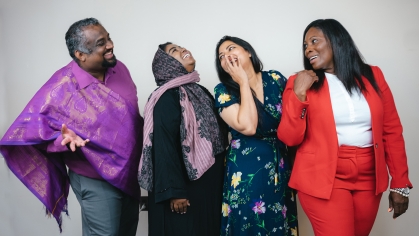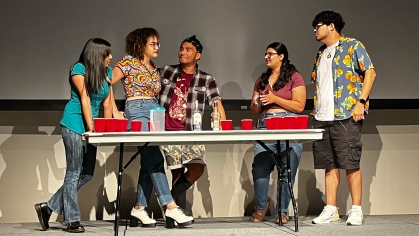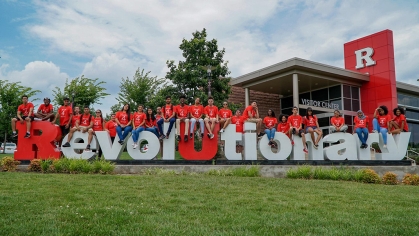How VPVA Provides Resources for Survivors and Allies during Domestic Violence Awareness Month
October marks the beginning of Domestic Violence Awareness and Prevention Month (DVAM), a month dedicated to bringing advocates and community members together to end domestic violence. At Rutgers University–New Brunswick, the Office of Violence Prevention and Victim Assistance (VPVA), with its campus partners, has taken a lead on providing support and programming during DVAM.
Additionally, in the last few weeks of September, VPVA runs the Clothesline Project, which bears witness to various experiences with interpersonal violence and helps set the groundwork for DVAM.
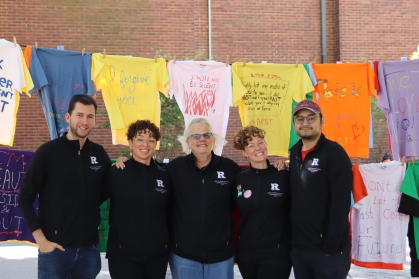
“Though we have regular programming outside of October, we do way more programming during Domestic Violence Awareness Month,” said Dr. Rebecca Vazquez, director of VPVA. “We also have an awareness campaign called ‘Turn the Campus Purple,’ as purple is the awareness color for domestic violence.”
Turn the Campus Purple (TTCP) is a month-long awareness campaign that takes place in October across the Rutgers community as a part of the National DVAM. The campaign aims to connect the entire university campaign, including advocates, students, organizations, faculty, staff, and university leadership to raise awareness of and support efforts to end all forms of domestic violence.
Throughout October, VPVA also runs additional sessions of Students Challenging Realities and Educating Against Myths (SCREAM) Theater, which uses improvisational student-led skits to educate the Rutgers–New Brunswick community on issues of interpersonal violence, with an emphasis on dating and domestic violence.
Notable student engagement events include the Purple Pumpkin Patch and Chalk the Block, as well as Purple Thursdays throughout the month, where campus members are encouraged to wear purple, create purple workspaces, and enjoy purple treats in the dining halls.
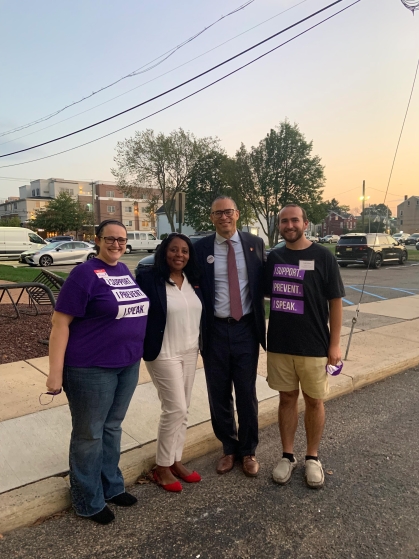
On top of these programming options, VPVA maintains free trauma-informed counseling and advocacy services, a hotline number for those impacted by violence, and a support system of survivors. Historically, the number of students attending programming from and accessing the resources of VPVA spikes in October.
To explain this phenomenon, Vazquez emphasized the commonality of domestic violence, even in young college students.
“In our last iSpeak survey, launched in 2018, we found that about 25% of our students were coming into Rutgers with domestic violence experience, and approximately 50% of students reported at least one experience of dating violence since coming to campus,” she said.
In that context, VPVA sees its work in DVAM and beyond as important not only for educating members of the Rutgers community about these topics, but also for providing tools with which they can have healthier and safer lives.
“Through our workshops, we can provide a space and language for many of our participants to work through their experiences and come to their own conclusions,” said Erin Snyder, associate director of VPVA.
“It’s important to know that domestic violence doesn’t necessarily mean physical violence, so we do a lot of education on financial abuse, sexual coercion, and are planning to expand our programming on tech abuse, among other topics.”
Additionally, VPVA programming for DVAM addresses the experiences and needs of Rutgers community members who have not always been the focus of advocacy and research surrounding domestic violence.
“Most of what we find in the research is very catered to the experience of white cisgender women and their experiences, and we would like to shine light on folks who don’t necessarily fit in that identity, whose experiences might have different layers that are not accounted for in popular media and literature,” said Vazquez.
“Dating violence crosses all identities and experiences, and we’re trying to be intentional about addressing the intersections of where our students are.”
The work of VPVA does not begin and end with students, however—it extends to staff and faculty members at Rutgers, who can also take a leading role in addressing domestic violence in their work with colleagues and students.
“As staff and faculty, we should assume that there are survivors in every space, and we should be able to direct survivors to supports like VPVA,” said Vazquez.
Snyder agreed.
“The statistics for domestic violence are very high. They don’t just disappear when we come into a workplace, so if we assume that we’re sharing spaces with survivors all the time, it could shape the way that we approach one another, the language that we use, and way that we occupy spaces to be more empathetic and compassionate.”
VPVA is located on 3 Bartlett Street, where it is open 9 a.m.–5 p.m., Monday–Friday. Crisis intervention and advocacy are available 24/7 on their hotline at (848) 932-1181 (press 0 after hours to connect with an advocate). You can find a link to a full list of their October schedule of events here. For more information, visit the VPVA website.
Financial support from alumni, parents, and friends helps us create the innovative learning opportunities that challenge students to be their best at Rutgers and beyond.
About the Division of Student Affairs at Rutgers–New Brunswick
The Division of Student Affairs is committed to facilitating interactions that promote students' success and their personal and professional development. Learn more about our mission.

